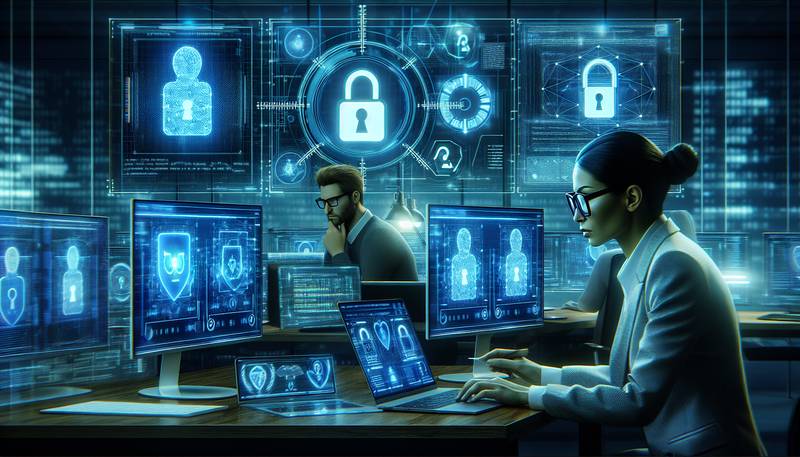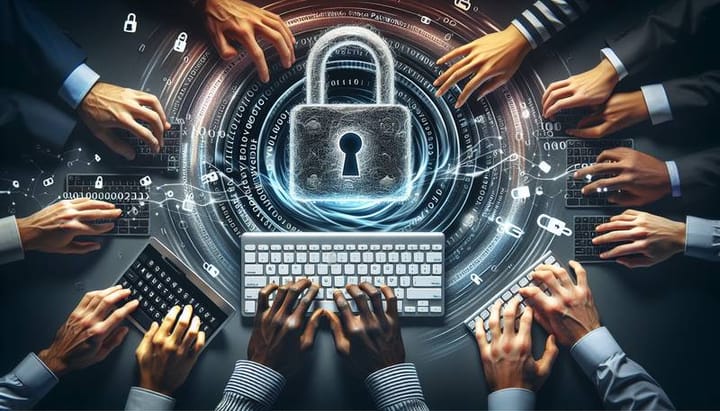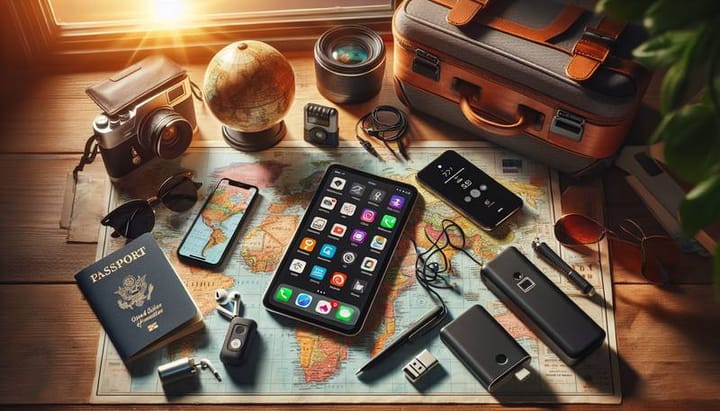Cybersecurity Basics: Keeping Your Personal Information Safe

Welcome to our comprehensive guide on cybersecurity basics! With the digital world becoming more integral to our daily lives, it's more important than ever to ensure your personal information remains safe and secure. Cybersecurity might sound like a complex topic, but with a few simple measures, you can significantly reduce the risk of your data falling into the wrong hands. So whether you're an internet novice or a tech-savvy individual, this guide provides essential tips that are both informative and entertaining - perfect for keeping your online identity protected.
Understanding the Threats
As we embark on this cybersecurity journey, the first step is understanding the threats that loom in the digital universe. The online world may seem like a vast and safe space to explore, but hidden dangers lurk within. Cyber threats come in various forms, and they are constantly evolving. The most common include phishing attacks, where scammers trick you into giving up personal information through fake emails or websites; malware, which consists of harmful software like viruses and ransomware that can damage or take control of your devices; and identity theft, where your personal data is stolen to commit fraud or other crimes.
These threats can manifest in everyday activities, making vigilance crucial. A harmless-looking email from what seems to be your bank can, in fact, be a phishing attempt. Downloading an app without verifying its legitimacy might install malware on your device. And your publicly shared details on social media could be pieced together by identity thieves to take over your identity.
But fear not! While these threats sound scary, awareness is the first line of defense. With the right knowledge, you can spot these dangers from a mile away and keep your digital self safe. It's all about being able to identify what looks fishy (pun intended) and knowing the red flags that signal cyber threat.
Creating Strong Passwords
Now, let's talk about one of the most fundamental aspects of cybersecurity: passwords. These little strings of characters are the keys to your online kingdom. But just as you wouldn't use a flimsy lock on your home's front door, you shouldn't secure your online accounts with weak passwords.
A strong password is like a good fence; it keeps unwanted guests out. It should be long – at least 12 characters – and a mix of upper and lower case letters, numbers, and symbols. It needs to be complex enough that it's not easily guessed. No birthdays, pet names, or simple patterns. And please, let's retire "password123" once and for all.
But remembering a unique, complex password for each online account can seem daunting. That's where password managers come in handy. These tools create and store strong passwords for you, so you only need to remember one master password. It's like having an encrypted digital diary of all your passwords, guarded by a password that's as tough as nails. And don't be tempted to use the same password across multiple sites. If one site gets breached, all your accounts become vulnerable.
Aside from strong passwords, enable two-factor authentication (2FA) wherever possible. This adds an additional layer of security by requiring a second form of identification beyond just your password - like a text with a code sent to your phone. It's like having a second lock on your door, and it can go a long way in protecting your accounts from unauthorized access.
Managing Your Online Presence
One of the most overlooked aspects of cybersecurity is managing your online presence. This means being mindful of the information you share online and actively controlling who can see it. Social media platforms are prime examples of where personal information is often over-shared. From your birthday to your family members' names and your location history, these tidbits can be exploited by cybercriminals.
It's important to frequently check your privacy settings on all social platforms. Restrict your posts to friends only, be cautious of accepting friend requests from strangers, and please, refrain from posting photos of every personal document or high-value item you own. Always keep in mind that once something is on the internet, it's potentially there forever, and sometimes just a few pieces of information are all a savvy criminal needs to impersonate you or access your accounts.
Another aspect of managing your online presence is being aware of what others post about you. It's wise to set up alerts for your name to keep tabs on what information about you is being shared online. Google Alerts can notify you whenever your name pops up on a website, blog, or forum, so you can take swift action if necessary. By constantly curating and monitoring your online footprint, you drastically reduce the risk of your personal information falling into the wrong hands.
Recognizing and Avoiding Scams
Scams are a dime a dozen on the internet, but they're not always easy to spot. From emails claiming you've won an international lottery you never entered to messages urging you to click on a link to 'verify' your account information, scammers have their ways of luring in unassuming victims. But with a discerning eye and a bit of skepticism, you can avoid these digital pitfalls.
A key tip in recognizing a scam is to look out for urgent or threatening language. If an email or message is coaxing you to act immediately, take a step back and assess the situation. Scammers often use this tactic to create a sense of panic and get you to provide personal information without thinking. Another red flag is poor grammar and spelling mistakes. Legitimate companies typically take pride in their communication and will rarely send out messages riddled with errors.
Furthermore, never click on a link or download an attachment from an unknown or suspicious source. These can often be tricks to install malware on your device or take you to a phishing site designed to steal your information. Always verify the legitimacy of a request by contacting the company directly using contact information from their official website, not the information provided in the suspicious message.
And remember, if something seems too good to be true, it probably is. No, you did not just win a gift card for a store you've never shopped at, and a foreign prince does not need your help to unlock his vast wealth. Trust your gut - if a message makes you feel uneasy, there's likely a good reason for it.
Protecting Your Data on Public Wi-Fi
We all love the convenience of public Wi-Fi. It's available at cafes, airports, and even parks, but did you know that public Wi-Fi is a hotbed for cyber threats? When you connect to an unsecured network, anything you do online - from checking emails to online shopping - can potentially be intercepted by someone else on the same network.
One critical step in protecting your data on public Wi-Fi is to use a virtual private network (VPN). A VPN encrypts your internet traffic, making it unreadable to anyone who might intercept it. It's like sending your data through a private tunnel that no one else can access. Always ensure you turn on your VPN before conducting any sensitive activities over public Wi-Fi.
Another measure is to be selective about what activities you perform on public networks. Avoid accessing financial accounts or making transactions that require your credit card information when connected to public Wi-Fi. It's best to save these tasks for when you're on a secure, private connection.
Additionally, always verify the Wi-Fi network before connecting. Cybercriminals often set up fake Wi-Fi hotspots with names similar to legitimate ones, hoping to trick users into connecting. If you're unsure about a network, ask an employee to confirm its legitimacy. And once you're done using the public Wi-Fi, disconnect from the network and forget it on your device so it doesn't automatically connect in the future.
The Importance of Software Updates
Last but not least, let's talk about software updates. Those pop-up notifications reminding you to update your software can be annoying - we get it. But they're much more than a pesky reminder - they're crucial for your online safety. Software updates often include patches for security vulnerabilities that have been discovered since the last update. Skipping these updates leaves your devices and the information they hold at risk.
Think of software updates as bolstering the walls of your digital fortress. Cybercriminals are always on the lookout for weaknesses to exploit, and outdated software is like a gaping hole in your defenses. By keeping your software updated, you're ensuring that the security is up-to-par and capable of warding off the latest cyber threats.
Setting your devices to update automatically can take the hassle out of the process. This way, you won't have to remember to manually initiate updates, and you'll always have the latest security features. And when an update is available, don't procrastinate. The sooner you update, the sooner you're protected from potential cyber-attacks.
In conclusion, maintaining good cybersecurity practices doesn't have to be a daunting task. With a strong understanding of the risks, robust passwords, careful management of your online presence, vigilance against scams, sensible use of public Wi-Fi, and up-to-date software, you can enjoy the vast world of the internet with confidence and peace of mind. Stay safe out there!
Protecting Your Data on Public Wi-Fi (continued)
While using a VPN and being mindful of the activities you engage in are great first steps, there's more you can do to protect your data on public Wi-Fi. Always ensure your device's firewall is activated. A firewall acts as a barrier between your device and the internet, monitoring incoming and outgoing traffic for potential threats. It's like having a bouncer at the door of your digital club, only letting in the guests that you've approved.
Lastly, consider using antivirus software on your devices. This software regularly scans your device for malware that could be used to steal your information. Think of it as having a security guard patrolling the area, keeping an eye out for anything suspicious. With these steps in place, you can browse with greater peace of mind even when using public Wi-Fi networks.
The Importance of Software Updates (continued)
Beyond just installing software updates, it’s essential to have a greater understanding of which updates are critical. For instance, always pay attention to updates on your operating system and your internet browser–these are often the most targeted by cybercriminals due to their widespread use. When an update for these comes out, it typically addresses particular vulnerabilities that have been either exploited or found to be susceptible to exploits.
Additionally, don’t neglect your mobile devices. Smartphones and tablets require just as much protection as your computer, and oftentimes we forget they’re just as susceptible to threats. Ensure that you also set these devices to update automatically so that you’re always running the latest, most secure software.
By staying on top of updates, you're not just protecting yourself; you're also contributing to the safety of everyone online. After all, cybersecurity is a collective effort. The more secure each individual's digital presence is, the safer we all are.
Conclusion: Stay Vigilant and Keep Learning
Cybersecurity might initially seem like an uphill battle, but it's essentially about forming good habits and staying informed. Summing up, remember that the digital world is ever-changing, and new threats will continue to emerge. Staying vigilant means continuously educating yourself on the latest cybersecurity trends and threats.
Never underestimate the importance of being proactive about your online safety. It's not just the responsibility of businesses and governments to protect your data — it's your responsibility too. By setting strong passwords, managing your online presence, recognizing scams, securing your data on public networks, and staying current with software updates, you're putting up a formidable defense against cyber threats.
Just like we learn to lock our homes, look both ways before we cross the street, and buckle our seatbelts, we must learn to protect our information with the same level of routine and care. Cybersecurity isn't a once-off task but an ongoing commitment to maintaining your safety in the digital space. It's about making smart choices and knowing that every layer of security you add is another hurdle for cybercriminals to overcome.
Embrace the digital age with confidence and a cybersecurity mindset. Keep your data locked down, your software up-to-date, and your digital wits about you. With these practices in place, you're not just safeguarding your personal information — you're contributing to a safer and more secure online world for everyone. Remember, in the vast digital ocean, be the savvy cyber-sailor, not the unsuspecting swimmer caught in the currents of cyber threats. Safe browsing, everyone!


